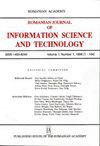二元无政府社会特征选择优化
IF 3.9
4区 计算机科学
Q1 COMPUTER SCIENCE, THEORY & METHODS
Romanian Journal of Information Science and Technology
Pub Date : 2023-09-28
DOI:10.59277/romjist.2023.3-4.08
引用次数: 0
摘要
“数据集包括特征的集合;然而,并非所有这些特性都是必需的。特征选择是识别最相关的特征,同时消除冗余或不相关的特征的过程。为了有效,特征选择应该在减少特征数量的同时提高分类性能。现有的算法可以调整和修改为特征选择器。在这项研究中,我们引入了无政府社会优化算法的实现,这是一种人类启发的算法,作为特征选择器。这是首次利用该算法的二进制版本进行特征选择的研究。提出的二元无政府社会算法在9个数据集上进行了评估,并与三种已知算法:二元遗传算法、二元粒子群算法和二元灰狼算法进行了比较。此外,还结合了四种传统的特征选择技术(信息增益、增益比、卡方和ReliefF)进行性能比较。我们的实验突出了所提出方法的竞争性,表明它有可能成为现有特征选择技术的一个有价值的补充。”本文章由计算机程序翻译,如有差异,请以英文原文为准。
Binary Anarchic Society Optimization for Feature Selection
"Datasets comprise a collection of features; however, not all of these features may be necessary. Feature selection is the process of identifying the most relevant features while eliminating redundant or irrelevant ones. To be effective, feature selection should improve classification performance while reducing the number of features. Existing algorithms can be adapted and modified into feature selectors. In this study, we introduce the implementation of the Anarchic Society Optimization algorithm, a human-inspired algorithm, as a feature selector. This is the first study that utilizes the binary version of the algorithm for feature selection. The proposed Binary Anarchic Society Algorithm is evaluated on nine datasets and compared to three known algorithms: Binary Genetic Algorithm, Binary Particle Swarm Optimization, and Binary Gray Wolf Optimization. Additionally, four traditional feature selection techniques (Info Gain, Gain Ratio, Chi-square, and ReliefF) are incorporated for performance comparison. Our experiments highlight the competitive nature of the proposed method, suggesting its potential as a valuable addition to existing feature selection techniques."
求助全文
通过发布文献求助,成功后即可免费获取论文全文。
去求助
来源期刊

Romanian Journal of Information Science and Technology
工程技术-计算机:理论方法
CiteScore
5.50
自引率
8.60%
发文量
0
审稿时长
>12 weeks
期刊介绍:
The primary objective of this journal is the publication of original results of research in information science and technology. There is no restriction on the addressed topics, the only acceptance criterion being the originality and quality of the articles, proved by independent reviewers. Contributions to recently emerging areas are encouraged.
Romanian Journal of Information Science and Technology (a publication of the Romanian Academy) is indexed and abstracted in the following Thomson Reuters products and information services:
• Science Citation Index Expanded (also known as SciSearch®),
• Journal Citation Reports/Science Edition.
 求助内容:
求助内容: 应助结果提醒方式:
应助结果提醒方式:


